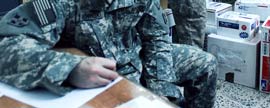The short answer is that depends.
My interpretation of the Army Language Policy contained in AR 600-20 paragraph 4-13 is that a Soldier should be required to speak English when performing official duties.
This issue can be a sensitive one. The Soldier has a responsibility to be proficient in English and the Leader has to ensure communications are clearly understood. Therefore the team must have an acceptable level of verbal communication. So if you are speaking about work related issues I would say English is a requirement. However depending on the situation the regulation leaves some latitude.
Notice the reference also states: “However, commanders may not require Soldiers to use English unless such use is clearly necessary and proper for the performance of military functions.” Accordingly,commanders may not require the use of English for personal communications that are unrelated to military function
As Soldiers we share many common bonds. Look at it this way even when all of us speak English…we still have problems communicating clearly to some degree in English. By adding another language into the communication mix with work related issues communications can become a very big barrier and result in miscommunication. As Soldiers we deal in situations that could result in the loss of life or limb. Therefore good communication in the performance of our duties and responsibilities is a must! Therefore I believe those communications should be in English.
Think of it this way. How would you feel if two individuals that spoke another language were constantly speaking their native language and it appeared to be either inappropriate or disruptive in nature. It can cause problems in a unit because perception and personalities become involved. My experience has shown me the most disruptive factor comes into play when a Leader believes a Soldier might be using their language skills to undermine the leaders authority or be disruptive to the organization.
Consider sitting down with the Soldier and explaining the issue and your concerns. Request their assistance in maintaining English for official communications. If the Soldier states they have difficulty with English as a second language then the Leader should provide assistance in helping the Soldier find a way to become a better English speaker either through Army Programs, Local Community programs, College Courses, etc. I found this technique usually works well. If speaking to the Soldier one on one about this issue does not work other actions might be appropriate.
If the Leader suspects the Soldier might be using their language talents to be disrespectful or disruptive the Leader might consider counseling the Soldier and if it is proven the Soldier was involved in substandard or inappropriate behavior the Leader can recommend appropriate action be taken.
Note: I would only counsel a Soldier about this type of behavior once I had spoken with the Commander/1SG on the issue and they have obtained a legal opinion from JAG. Because the response to this issue will most likely result in a company policy rather than a squad or platoon policy.
Leaders need to make sure they are not being overly sensitive to this issue and Soldiers need to ensure their actions are appropriate and acceptable.
AR 600-20
4–13. Army language policy
English is the operational language of the Army. Soldiers must maintain sufficient proficiency in English to perform their military duties. Their operational communications must be understood by everyone who has an official need to know their content, and, therefore, must normally be in English. However, commanders may not require Soldiers to use English unless such use is clearly necessary and proper for the performance of military functions. Accordingly, commanders may not require the use of English for personal communications that are unrelated to military functions.
Did you find this information useful? We appreciate your feedback!
TOP














